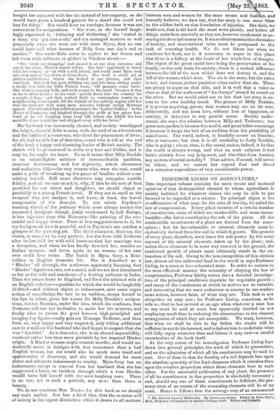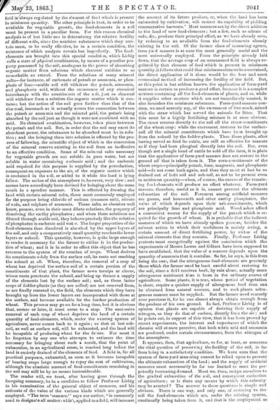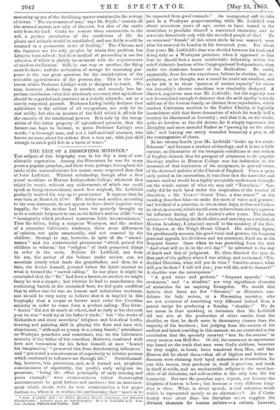PROFESSOR LIEBIG ON AGRICULTURE.* THIS important volume contains the most
recent and matured opinions of that distinguished chemist to whom agriculture is mainly indebted for whatever claims she may be able to put forward to be regarded as a science. Its principal object is the re-affirmation of what may, for the sake of brevity, be called the law of compensation. Every plaut consists of a certain number of constituents, some of which are combustible, and some incom- bustible—the latter constituting the ash of the plant. All the combustible constituents of a plant are derived fi om the atmo- sphere ; but its incombustible, or mineral, elements must be exclusively derived from the soil in which it grows. The growth of every plant, therefore, must leave the soil poorer by the exact amount of the mineral elements taken up by the plant; and, unless these elements be in some way restored to the ground, the continued growth of plants must ultimately result in the ex- haustion of the soil. Owing to the non-recognition of this obvious law, almost all the cultivated land in the world is, says Professor Liebig, in a snore or less exhausted state. In order to enforce in the most effectual manner the necessity of obeying the law of compensation, Professor Liebig enters into a detailed investiga- tion of the principal conditions requisite for vegetable growth ; and many of the conclusions at which lie arrives are so valuable and interesting that we must endeavour to convey to our readers some notion, however faint, of what they are. This task is not altogether an easy one ; for Professor Liebig, conscious, as he tells us, that lie has arrived at an age when whatever a man has to say must be said at once, has apparently decided on not employing much time in reducing his observations to the clearest arrangement of which they are susceptible. We trust, however, that what we shall be able to lay before the reader will be sufficient to excite his interest, and to induce him to undertake what will fully repay whatever time and labour it may cost—a careful examination of the book itself.
At the very outset of his investigation Professor Liebig lays down two general. principles, the truth of which he guarantees, and on the admission of which all his conclusions may be said to rest. One of these is that the fertility of a soil depends less upon the absolute quantity of the food-elements which it contains than upon the relative proportion which these elements bear to each other. For the successful cultivation of any plant, the presence of all its constituents in due proportion is absolutely necessary ; and, should any one of these constituents be deficient, the pre- sence even of an excess of the remaining elements will be of no avail. Hence it follows that the average crop of an unrnanured • The Natural Lows of Husbauclry. By Justus von Liable. Edited by John Blyth,, M.D., Professor of Chemistry in Queen's College, Cork. Walton and Moberly.
field i always regulated by the element of fool which is present in minitnutn quantity. The other principle is that, in order to be available for vegetable growth, the food-elements in a soil mist be present in a peculiar form. For this reason chemical analysis is of but little usa in determining the relative fertility of different soils, since the nutritive substances which they con- tain must, to be really effective, be in a certain condition, the existence of which analysis reveals but imperfectly. The food- elements are brought into this special condition, which Liebig calls a state of physical combination, by means of a peculiar pro- perty possessed by the soil, analogous to the power of absorbing oti;anic matter from solutions which charcoal exhibits to so remarkable an extent. From the solutions of many mineral salts—for instance, of carbonate of potash or ammonia, or phos- phate of lime—arable soil will withdraw the potash, ammonia, and phosphoric acid, without the occurrence of any chemical interchange with the constituents of the soil, jast us charcoal will withdraw from a solution the organic matter which it con- tains; but the action of the soil goes further than that of the charcoal, inasmuch as it actually severs the connection between the potash or ammonia and the mineral acid, the potash being absorbed by the soil just as though it were not combined with an acid. No chemical combination, however, takes place between the potash and the soil. But, in order that the soil may exert its absorbent power, the substances to be absorbed must be in solu- tion; and the bringing them into solution is effected by the pro- cess of fallowing, the scientific object of which is the conversion of the mineral reserve existing in the soil from an ineffective to an effective condition. Some of the mineral salts necessary for vegetable growth are not soluble in pure water, but are soluble in water containing carbonic acid ; and the carbonic acid required for this purpose is supplied by the putrefaction, consequent on exposure to the air, of the organic matter which is contained in the soil, or added to it while the land is lying fallow. The action of the atmosphere is, however, very slow ; and means have accordingly been devised for bringing about the same result in a speedier manner. This is effected by dressing the land with certain mineral salts, those most commonly employed for the purpose being chloride of sodium (common salt), nitrate of soda, and sulphate of ammonia. These salts, as chemists well know, possess, even in their most dilute solutions, the property of dissolving the earthy phosphates ; and when these solutions are filtered through arable soil, they behave precisely like the solution of phosphates in carbonic acid water. The larger proportion of the food-elements thus dissolved is absorbed by the upper layers of the soil, and only a comparatively small quantity reaches the lower layers or subsoil. This quantity, however, is quite large enough to render it necessary for the farmer to utilize it in the produc- tion of wheat; and it is in order to effect this object that he has recourse to the system of the rotation of crops. Wheat derives its constituents solely from the surface soil, its roots not reaching the subsoil at all. When, therefore, the removal of a crop of wheat has deprived the surface soil of a certain portion of the constituents of that plant, the farmer sows turnips or clover, whose roots penetrate the subsoil, and bring up thence a supply of the elements lost by the surface soil ; and, as these latter crops of fodder-plants (as they are called) are not removed from, or are finally restored to, the field, the elements which they have brought up from the lower layers are incorporated with those at the surface, and become available for the further production of wheat. This process may go on for a long time, but it is obvious that, sooner or later, it must come to a stop. The successive removal of each crop of wheat deprives the land of a certain quantity of food-elements, which, under the existing system of agriculture, never comes back to it again ; so that at last sub- soil, as well as surface soil, will be exhaitsted, and the laud will be incapable of producing wheat for the future. Nor must it be forgotten by any one who attempts to estimate the time necessary for bringing about such a result, that the point of exhaustion, in an agricultural sense, is reached long before the laud is entirely drained of the elements of food. A field is, for all practical purposes, exhausted, as soon as it becomes incapable of bearing crops large enough to repay the cost of cultivation, although the absolute* amount of food-constituents remaining in the soil may still be by no means inconsiderable.
The reader will, we trust, after having gone through the foregoing summary, be in a condition to follow Professor Liebig in his examination of the general object of manures, and his estimate of the value of the various kinds which are generally employed. "The term manure,'" says our author, "is commonly used to designate all matter ; wbilet, applied to afield, will increase
the amount of its future produce, or, when the land has been exhausted by cultivation, will restore its capability of yielding remunerative harvests." Most manures act by the direct addition to the laud of new food-elements ; but a few, such as nitrate of soda, &c., produce their principal effect, as we have already seen,. by reducing to an available form the food-elements already existing in the soiL Of the former class of manuring agents, farm yard manure is at once the most generally useful and the most universally employed. From the principle already laid down, that the average crop of an unit-tenured field is always re- gulated by that element of food which is present in minimum quantity, it follows that could that minimum element be ascertained, the direct application of it alone would be the best and most economical method of increasing the fertility of the field. But,. as this point is but seldom known, the application of farm-yard. manure is certain to produce a good effect, because it is a complex mixture containing all the food-elements of plants, and so, while it supplies other matters which are not imanediately wanted, it also furnishes the minimum substance. Farm-yard manure con- sists, we need scarcely say, of the excrement of live-stock, mixed. with the straw which has served the animals for litter. That this must be a highly fertilizing mixture is at once obvious.. The straw returns directly to the soil all the straw-constituents of the wheat crop; while the excrement restores to the surface- soil all the mineral constituents which have been brought up from the subsoil by the fodder-plants. Thus these plants, after- having served as food for cattle, are still as effective for manure as if they had been ploughed directly into the soil. But, even though not a single head of cattle be sold off the farm, it is plain that the application of farm-yard manure does not restore to the ground all that is taken from it. The corn-constituents of the wheat crops—principally potash, lime, magnesia, and phosphoric acid—do not come back again, and thus they must at last be so. drained out of both soil and sub-soil, as not to be present even in minimum quantity—when, of course, the excess of the remain- ing fool-elements will produce no effect whatever. Farm-yard manure, therefore, useful as it is, cannot prevent the ultimate- exhaustion of the soil. Foremost among artificial manures are guano, and bone-earth and other earthy phosphates, they value of which depends upon their ash-constituents, which are principally lime and phosphoric acid. Wood ashes afford a convenient source for the supply of the potash which is re- quired for the growth of wheat. It is probable that the indirect manures of which we have already spoken possess, besides the solvent action to which their usefulness is mainly owing, a certain amount of direct fertilizing power, by virtue of the mineral elements that they contain. Finally, Professor Liebig protests most energetically against the conclusion which the experiments of Messrs Lewes and Gilbert have been supposed to have established, that the value of a manure depends upon the quantity of ammonia that it contains. So far, he says, is this from being the case, that the nitrogenous food-elements are precisely those which the farmer need be least careful about restoring te the soil, since a field receives back, by rain alone, actually more nitrogenous nutriment than it loses in the ordinary course of agriculture. Some plants, it is true, whose period of vegetation is short, require a quicker supply of nitrogenous food than can be obtained from natural sources; and to such plants nitro- genous manure must be supplied. But the farmer need scarcely ever purchase it, for ho can almost always obtain enough from the produce of his own ground. In fact, Professor Liebig is of opinion that plants are capable of deriving their supply of nitrogen, as they do that of carbon, directly from the air ; and he points out, in support of this view, that it has been proved by recent experiments, the interest and importance of which the chemist will at once perceive, that both nitric acid and ammonia are produced, under certain circumstances, from the nitrogen of the atmosphere.
It appears, then, that agriculture, so far, at least, as concerns- the vital question of preserving the fertility of the soil, is far from being in a satisfactory condition. We have seen that the system of farm-yard manuring cannot be relied upon to prevent the ultimate exhaustion of the land ; and the supply of artificial manures must necessarily be far too limited to meet the per- petually increasing demand. Must we, then, resign ourselves to the gradual exhaustion of the soil, and consequent extinction of agriculture ; or is there any means by which this calamity may be averted ? The answer to these questions is simple and obvious. There is one way, and only one, of restoring to the soil the food-elements which are, under the existing system, continually being taken from it, and that is the employment as
manuring agents of the fertilizing matter contained in the sewage of towns. " The excrements of man," says Dr. Blyth," contain all the mineral matter, not only of the corn, but also of the cattle sold from the land. Could we restore these excrements to the soil, a perfect circulation of the conditions of life for plants and animals would be established, and our fields would be retained in a permanent state of fertility." The Chinese and the Japanese are the only peoples by whom this problem has hitherto been solved ; but their method of proceeding is one the adoption of which is plainly inconsistent with the requirements of modern civilization. Still, in one way or another, the thing must be done ; and the utilization of sewage for manuring pur- poses is the one great question for the consideration of the scientific agriculturists of the present day. This is the chief lesson which Professor Liebig's work is designed to teach. We may, however, deduce from it another, and scarcely less im- portant conclusion—that it is absolutely necessary that agriculture should be regarded and practised as a strictly scientific, not as a merely empirical, pursuit. Professor Liebig boldly declares that -agriculture is the noblest of all occupations, not only for its real utility, but also on account of the field which it affords for the exercise of the intellectual powers. It is only by the recog- nition of this latter property of agricultural pursuits, that the farmer can hope to become, to quote Professor Liebig's own words, "a thorough man, and not a half-and-half creature, who knows no more about his actions than a tom cat, with just skill .enough to catch gold fish in a basin of water."
































 Previous page
Previous page